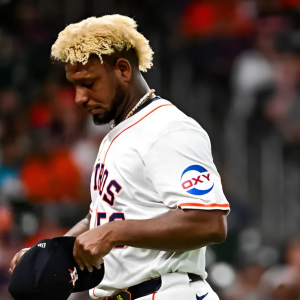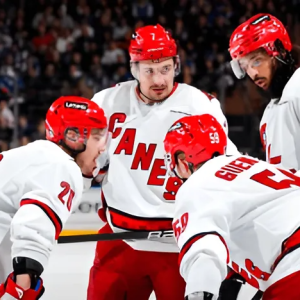In the 1970s and 1980s, the Philadelphia Flyers defined what it meant to be a winning franchise. From their 1972-73 campaign through 1988-89, they made it to the Stanley Cup Final six different times, winning two championships in the process. Not having missed the playoffs a single time in that 17-season period, the Flyers were definitively the most successful franchise of the “Next Six” expansion era that started in 1967.
Once that run ended, though, the Flyers were in some serious trouble. In their entire 23-season history to that point, they had only missed the playoffs twice. Realizing their core was fading and there was nothing to supplement it, they entered a rebuild; a real rebuild.
Only one member from their 1989-90 team, Ron Hextall, remained by the time 1994-95 rolled around. Even he was traded but then reacquired during the process, putting the Flyers’ complete teardown into context. How did they build it back up, and how did it end up?
Flyers Acquire Their New Franchise Star
This wasn’t exactly the first move in the entire sequence of events, but it was definitely the most important. On June 30, 1992, the Flyers made a stunner of a deal to get their first true superstar since they had Bobby Clarke during the Broad Street Bullies era. They dealt youngsters Peter Forsberg, Mike Ricci, and Chris Simon, plus Steve Duchesne, Ron Hextall, Kerry Huffman, two first-round draft picks, and a cash sum of $15 million to the Quebec Nordiques for Eric Lindros.
Of course, this was a lot to give up. At the same time, it set the Flyers up for, potentially, many seasons of success if Lindros became a star. A former first-overall pick from the 1991 NHL draft and seen as a generational prospect, it was certainly a possibility. Philadelphia banked on it being the case.
Surrounding Lindros with Talent
The Flyers had already been wheeling and dealing for top-line caliber players prior to their trade for Lindros, but it didn’t stop after he was acquired, either. The process began on Sept. 22, 1991, when they dealt Ron Sutter and Murray Baron to the St. Louis Blues for Dan Quinn and a 21-year-old Rod Brind’Amour. The latter already had a career-high of 61 points in 79 games at that point, so landing him was pretty big.
Just months before the Lindros trade, the Flyers dealt Rick Tocchet, Kjell Samuelsson, Ken Wregget, and a third-round draft pick to the Pittsburgh Penguins for Brian Benning, a first-round pick, and a freshly 24-year-old Mark Recchi. This deal came with a much bigger sacrifice, but Recchi was a 113-point player in his career already; Lindros had some significant talent around him now.
The Flyers weren’t done building after they got Lindros, though. On Feb. 9, 1995, they traded Recchi and a third-round pick to the Montreal Canadiens for Gilbert Dionne, John LeClair, and Eric Desjardins. Those last two became the major pieces of the trade, serving as building blocks for the Orange and Black. They hadn’t shown top-tier potential at the time and they were both 25, but that was coming very shortly.
Flyers’ Moves Set Them up for Success
On just about all of the trades mentioned, the Flyers hit it out of the park. Lindros became the superstar they envisioned, Brind’Amour flashed 100-point potential and his two-way abilities, LeClair went from a player scoring at a 46-point pace to well over 100 the same season he was acquired, and Desjardins built off of a promising career in Montreal and became a Norris Trophy caliber defender very quickly. Adding some depth and a second-round steal in Mikael Renberg during the 1990 NHL draft, the Flyers were built to contend.
From 1989-90 through 1993-94, the Flyers didn’t make the playoffs a single time. Once they got LeClair and Desjardins, though, everything was complete – it was one of the reasons why Lindros won the Hart Trophy in 1994-95. That season, they went to the Eastern Conference Final, losing to the New Jersey Devils in six games. Even with that crushing defeat, they showed that a little bit of patience could go a long way. With a young core, they had a good shot at doing some damage in the postseason.

In 1995-96, the Flyers had another successful season but were bounced in the second round. It wasn’t for a lack of trying, acquiring future Hall of Fame forward Dale Hawerchuk. Sometimes, losing in the playoffs just happens.
Philadelphia’s 1996-1997 season was the peak of the Lindros years. Everything went right for them, cruising through the first three rounds of the postseason with a 12-3 record overall. Unfortunately, the dynasty of the Detroit Red Wings just so happened to be brewing. While the Flyers should have had a solid chance to win it all, they were swept in the Stanley Cup Final, dying with a whimper.
The Flyers’ Downfall Was Their Own Fault
The major undoing of Lindros’ career was his injury struggles. Out of 380 possible regular season contests from the time he started with the Orange and Black through his 1996-1997 campaign, he missed 83 of them (21.8 percent). He helped make the Flyers a contender, but the cost was that he wasn’t always available. Concussions were his most common injury, and they can have lasting impacts.
While the Flyers’ failures over their next two seasons–not winning a single playoff series–weren’t because of these injuries, they were going to spring up again soon. It’s what destroyed this era in a sense, and Lindros’ career.
Lindros missed a third of his 1999-00 regular season and extended time in the postseason, but the Flyers were resilient nonetheless. Without their franchise center, they went to the Eastern Conference Final and took a 3-1 series lead over the Devils. Lindros tried his hardest to return, and he eventually did in Game 6. Unfortunately, the Orange and Black allowed New Jersey to rally back to force a Game 7 despite his best efforts. Then, the hit happened.
Eight minutes into the first period of a 1-0 Devils lead at Wells Fargo Center (known as First Union Center at the time), Lindros took an open-ice hit from hard-hitting defenseman Scott Stevens. He remained motionless on the ice and would not return in the Flyers’ devastating 2-1 loss, giving up the go-ahead goal with under three minutes left in the third period. The Devils went on to win the Stanley Cup.
By that point, Lindros’ relationship with Clarke, the general manager (GM), was completely shattered. The two didn’t like each other, and Lindros’ health wasn’t taken very seriously by anyone. He, quite literally, almost died due to the team’s negligence. While he was still recovering from a concussion, he was stripped of his captaincy. Perhaps in the history of sports, no other superstar has ever been abused like this. He never played another game with the Flyers.
It was an unfortunate situation where all of the things that former GM Russ Farwell built up were torn down very soon after. Lindros could no longer play hockey as well as he used to because his concussions weren’t taken seriously; it shows just how much hockey has evolved since then.
The Flyers were still a solid team after Lindros departed, making the playoffs in five straight seasons and making it to another Game 7 contest in the Eastern Conference Final, but they were another star player short of winning a Stanley Cup. Clarke probably should have realized this sooner, sticking around as the GM through 2005-06, but it’s all history now.
There is a world out there where the Flyers end up winning a Stanley Cup due to their 1990s rebuild. Perhaps Lindros’ injuries are met with a proper response and they extend their window because of it. Maybe they don’t give up copious assets for Pat Falloon and Alexandre Daigle. The possibilities are endless, but they didn’t get it done at the end of the day.





